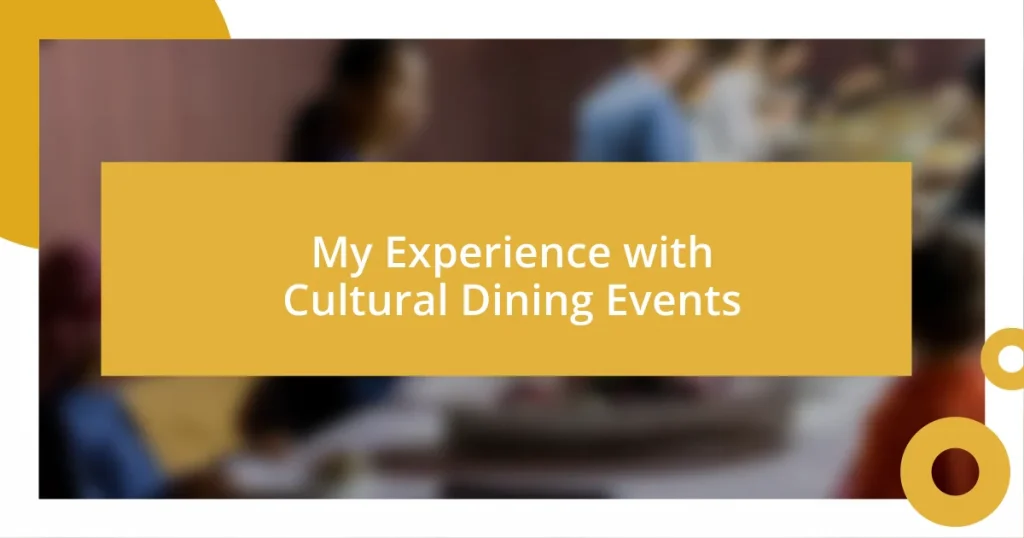Key takeaways:
- Cultural dining events celebrate community and tradition, offering immersive experiences that connect participants to diverse culinary histories.
- Engaging with unfamiliar cuisines fosters emotional connections and curiosity, enhancing appreciation for different cultures and their values.
- These events create networking opportunities, transforming strangers into friends while highlighting the shared stories and bonds formed through food.
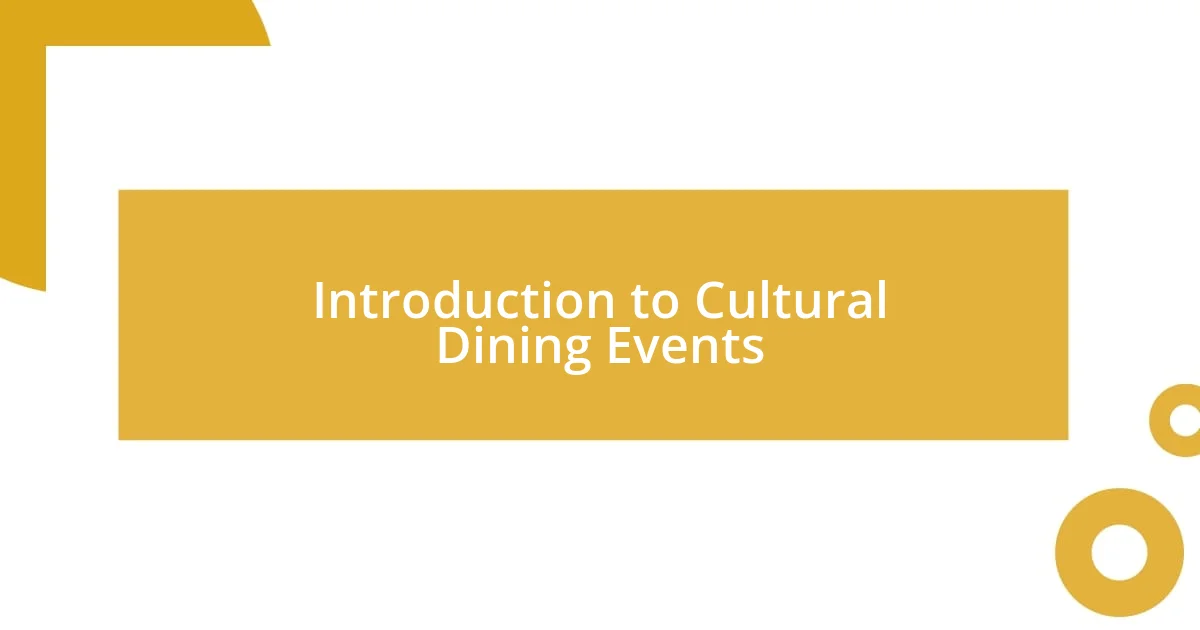
Introduction to Cultural Dining Events
Cultural dining events are more than just meals; they are a celebration of community, tradition, and shared experiences. I remember my first cultural dining event—a vibrant Moroccan feast where the rich aromas of spices filled the air. It made me wonder, how often do we truly immerse ourselves in a cuisine that’s rooted in history and storytelling?
Attending these events allows you to step into another world, even if just for an evening. One time, I found myself at a Thai New Year banquet, surrounded by colorful decorations and lively music. Engaging with the locals and experiencing their customs firsthand filled me with a sense of belonging and excitement that I had never felt before.
These gatherings often feature unique dishes that tell the story of a culture’s heritage. It’s fascinating to consider how a single bite can transport you to a bustling market or a family gathering in another part of the world. Have you ever tasted a dish that not only delighted your palate but also opened your eyes to a different way of living? I certainly have, and it sparked a deeper appreciation for the richness of diverse culinary traditions.
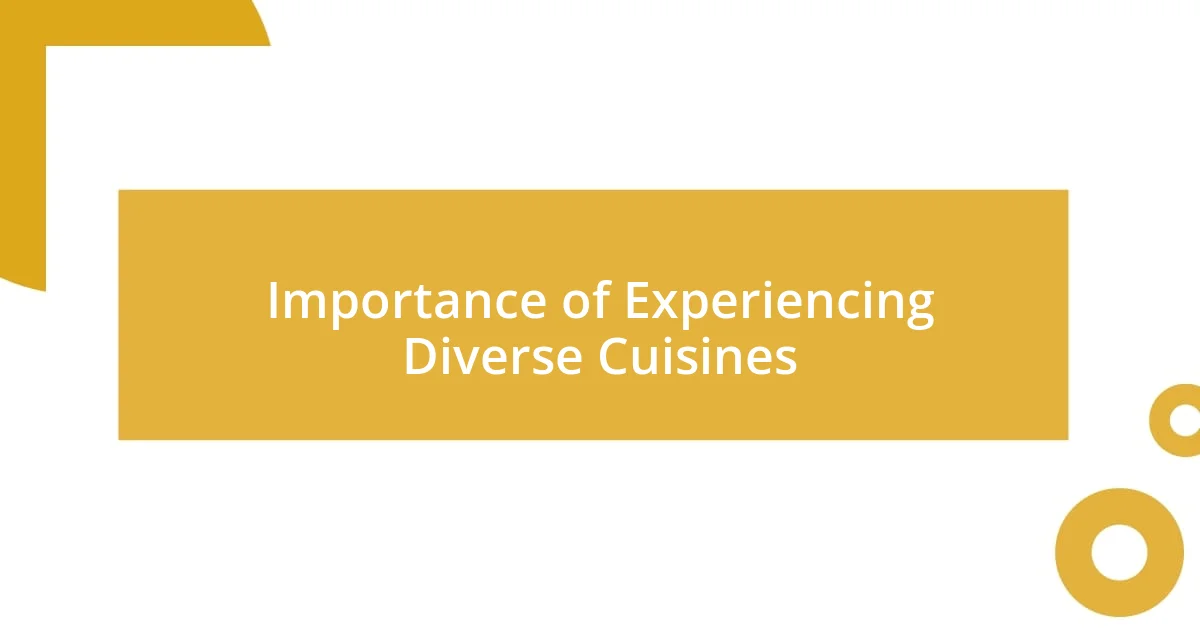
Importance of Experiencing Diverse Cuisines
Experiencing diverse cuisines truly broadens our horizons. I recall attending a Brazilian churrasco, where the sizzling meat on skewers was just part of the ambiance. Surrounded by laughter and samba music, I felt the warmth of a culture that values togetherness. It’s amazing how food can connect us, transcending language and geography, fostering understanding and appreciation among different communities.
When we dive into unfamiliar culinary experiences, we often discover new flavors, textures, and cooking techniques. I was completely enchanted during a Korean dining experience filled with banchan—small side dishes that offered a tantalizing range of tastes. Each bite was a mini-exploration, showcasing the meticulous care behind the dishes. This not only satisfies cravings but also invites a sense of curiosity about the history and values that influenced those recipes.
Moreover, diverse cuisines can evoke emotions tied to traditions, family, and memories. I remember sharing a rich, creamy Indian curry with new friends at a cultural event, soaking in their stories of heritage. It reminded me that food is deeply intertwined with identity. These moments encourage us to reflect on our own backgrounds while fostering connections through shared experiences around the table.
| Experience | Emotional Insight |
|---|---|
| Brazilian churrasco | Felt the warmth of togetherness |
| Korean banchan | Curiosity about culinary history |
| Indian curry | Cultural connection and reflection |

Preparing for Your First Event
Preparing for your first cultural dining event can be both exciting and a bit daunting. I remember my nerves before attending an Ethiopian dinner, unfamiliar with the traditional injera and the communal eating style. It was a delightful challenge to navigate the flavors, and that initial apprehension quickly faded as I engaged with the vibrant atmosphere and the stories shared around the table.
Here are some key tips to help you prepare for your first experience:
- Research the Cuisine: Familiarizing yourself with the dishes and dining customs can enhance your understanding and appreciation.
- Dress Appropriately: Some events might have specific attire; checking in advance can make you feel more comfortable and integrated.
- Bring a Friend: Sharing the experience with someone can ease nerves and allow for more lively conversations.
- Be Open-Minded: Embrace new flavors and techniques, even if they differ from what you’re used to.
- Ask Questions: Engaging with fellow diners or hosts enhances the experience and deepens connections.
Ultimately, showing respect for the culture being represented and being open to learning will enrich your experience tremendously. I recall asking about the significance of certain spices at a Moroccan feast, which opened up fascinating discussions with the host about family traditions that have spanned generations.
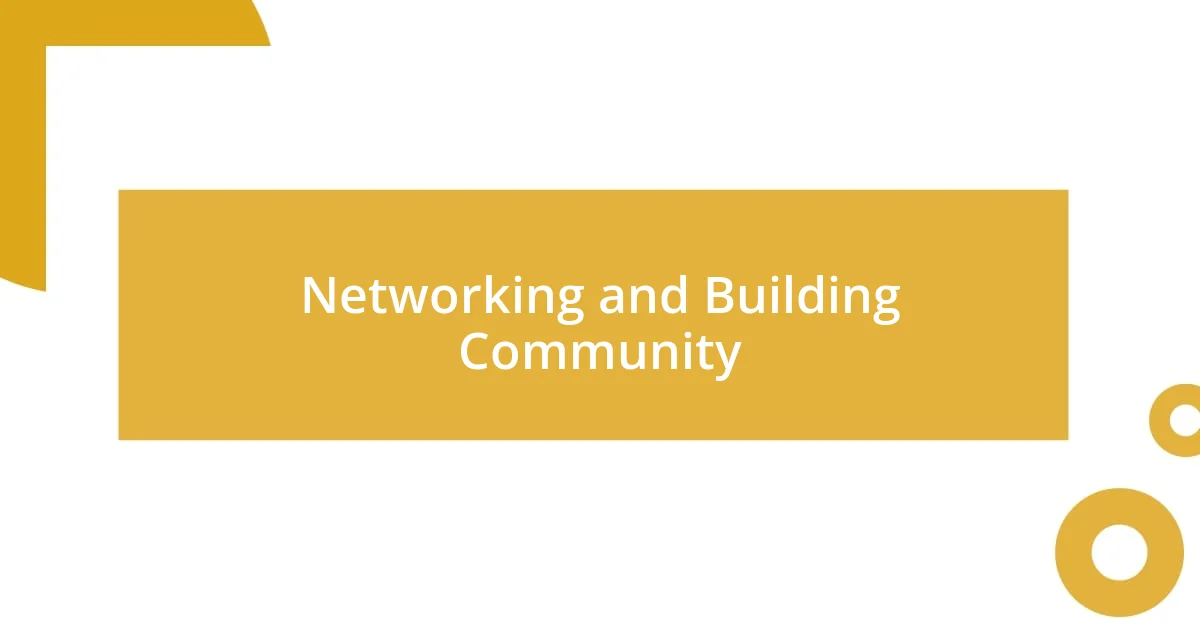
Networking and Building Community
When I think about attending cultural dining events, one of the greatest joys is the opportunity for networking and building a community. At a recent Vietnamese potluck, I was struck by how simply sharing a bowl of phở with someone ignited genuine conversations. Have you ever noticed how a shared meal makes it easier to approach someone new? It’s like a bridge created instantly over those fragrant noodles.
Engaging with people from different backgrounds often leads to unexpected connections. I remember bumping into a fellow guest at a Nigerian feast, where we laughed over our mutual confusion about the spicy jollof rice. By the end of the night, we exchanged contact information, and that little moment blossomed into a lasting friendship. It’s fascinating how food can act as a catalyst for discussions that go beyond culinary tastes, delving into culture and experiences.
Cultural dining events aren’t just about the food; they can transform strangers into friends and acquaintances into collaborators. While conversing with artisans at an Italian wine and cheese night, I found myself inspired to start a project on local culinary traditions. The space buzzing with creativity reminded me that every plate holds a story. How can we not feel invigorated when surrounded by individuals who share our enthusiasm for community and culture?
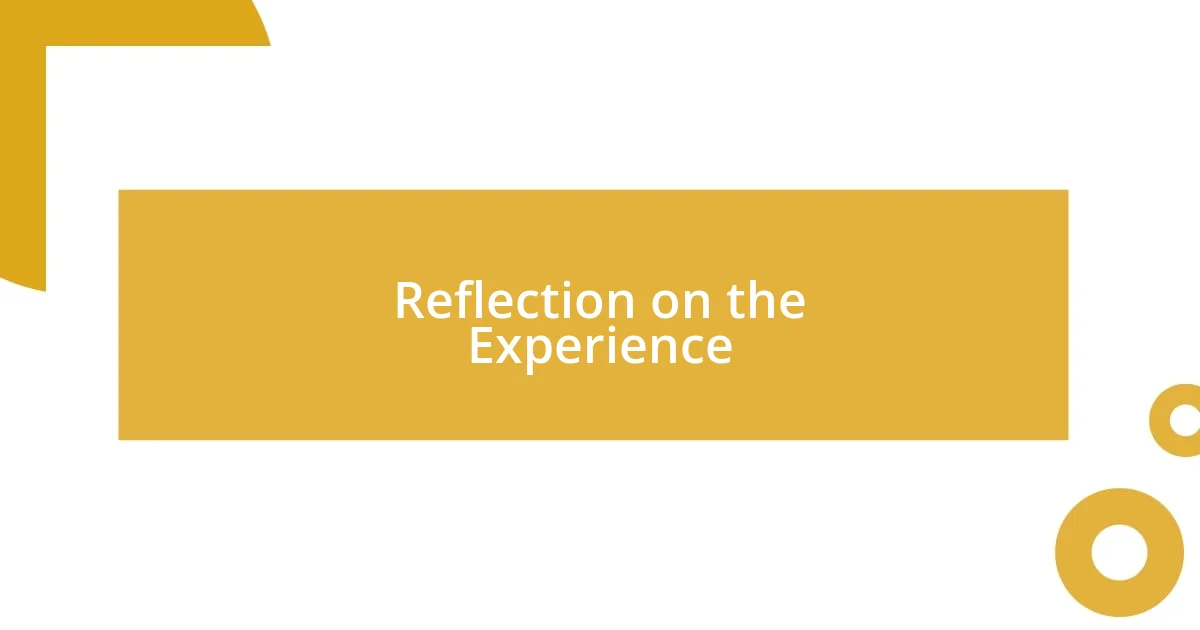
Reflection on the Experience
Reflecting on my experiences with cultural dining events, I often find myself amazed at how each occasion becomes a microcosm of the world. I vividly remember an Indian dinner where the vibrant spices mirrored the warm conversations. It struck me how food transcends language barriers; a shared plate of biryani became a medium through which laughter and stories flowed effortlessly. Have you ever picked up on the subtle connections that develop over a meal, how they somehow make the world feel just a little smaller?
One particular evening, during a Lebanese feast, I felt a profound emotional connection while discussing family recipes with the host. She shared the story of her grandmother’s humble kitchen, where she learned to make tabbouleh, and I couldn’t help but feel the nostalgia ripple through our conversation. Moments like this remind me that dining isn’t just about sustenance; it’s about forging bonds rooted in shared histories and traditions. Isn’t it incredible how a simple dish can evoke memories that span generations?
As I reflect further, I realize that each dining event has woven its own thread into my tapestry of experiences. A recent Japanese kaiseki meal introduced me to the delicate artistry of presentation—the food became a visual story, a celebration of seasonal changes. I found myself pondering: what stories lie behind our everyday meals? Each experience not only filled my stomach but expanded my understanding of the world. Cultural dining not only tantalizes the taste buds but also enriches the soul in ways that linger long after the last bite.










